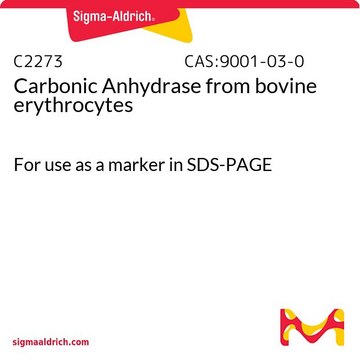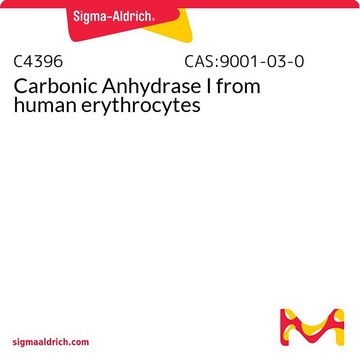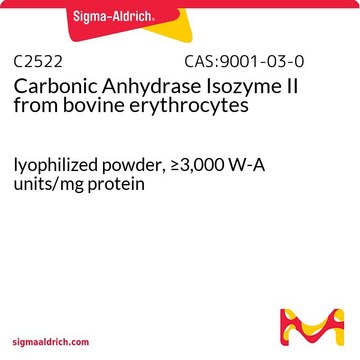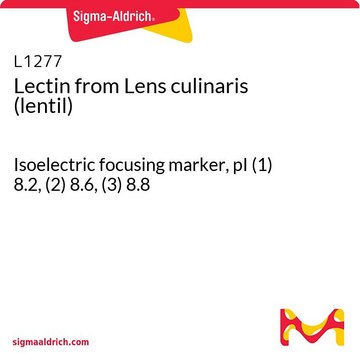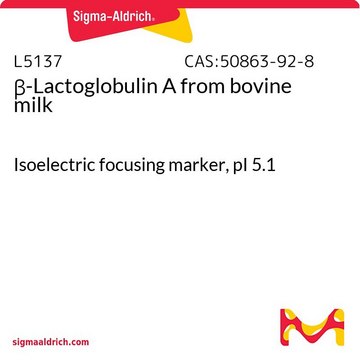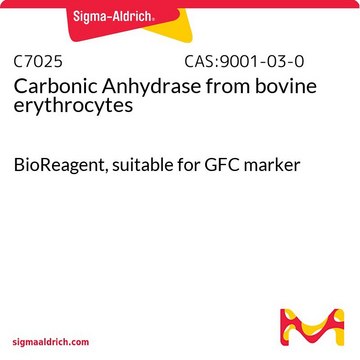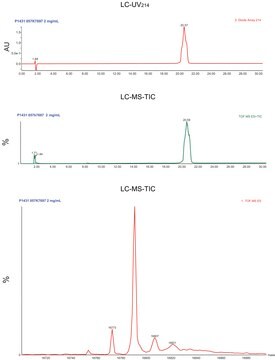C6653
Carbonic Anhydrase I from human erythrocytes
Isoelectric focusing marker, pI 6.6
Synonym(s):
Carbonate Dehydratase, Carbonate Hydrolyase, Carbonic Anhydrase Isozyme I
Sign Into View Organizational & Contract Pricing
All Photos(1)
About This Item
Recommended Products
Looking for similar products? Visit Product Comparison Guide
Related Categories
Application
Carbonic Anhydrase I from human erythrocytes has been used as a pI (isoelectric point) marker in two-dimensional gel electrophoresis.
Biochem/physiol Actions
Carbonic Anhydrase I from human erythrocytes is a protein which is used as a standard pI (isoelectric point) marker for isoelectric focussing experiments.
Signal Word
Danger
Hazard Statements
Precautionary Statements
Hazard Classifications
Resp. Sens. 1
Storage Class Code
11 - Combustible Solids
WGK
WGK 3
Flash Point(F)
Not applicable
Flash Point(C)
Not applicable
Personal Protective Equipment
dust mask type N95 (US), Eyeshields, Gloves
Certificates of Analysis (COA)
Search for Certificates of Analysis (COA) by entering the products Lot/Batch Number. Lot and Batch Numbers can be found on a product’s label following the words ‘Lot’ or ‘Batch’.
Already Own This Product?
Find documentation for the products that you have recently purchased in the Document Library.
Customers Also Viewed
The focusing positions of polypeptides in immobilized pH gradients can be predicted from their amino acid sequences.
Bjellqvist B, et al.
Electrophoresis, 14, 1023-1031 (1993)
Two-dimensional gel isoelectric focusing.
Stastna M and Slais K
Electrophoresis, 26, 3586-3591 (2005)
Forskolin and camptothecin induce a 30 kDa protein associated with melatonin production in Y79 human retinoblastoma cells.
Janavs JL, et al.
The Journal of Neuroscience, 15, 298-309 (1995)
Xiuhong Shan et al.
Journal of computer assisted tomography, 37(1), 22-28 (2013-01-17)
The objective of this study was to investigate the correlation between the degree of necrosis displayed in computed tomography (CT) image and the expression of hypoxic and angiogenesis biomarkers of breast cancer. Forty-four breast cancer cases were examined with CT
Bernardo V Alvarez et al.
BMC cardiovascular disorders, 13, 2-2 (2013-01-10)
Carbonic anhydrase enzymes (CA) catalyze the reversible hydration of carbon dioxide to bicarbonate in mammalian cells. Trans-membrane transport of CA-produced bicarbonate contributes significantly to cellular pH regulation. A body of evidence implicates pH-regulatory processes in the hypertrophic growth pathway characteristic
Our team of scientists has experience in all areas of research including Life Science, Material Science, Chemical Synthesis, Chromatography, Analytical and many others.
Contact Technical Service

